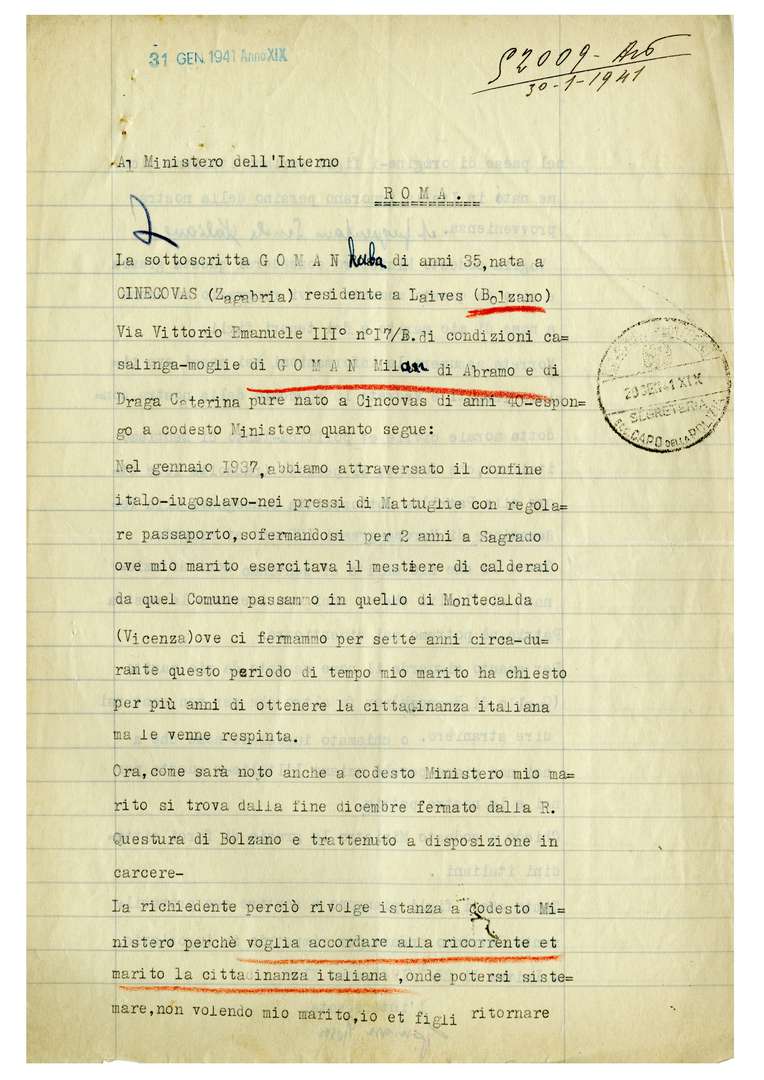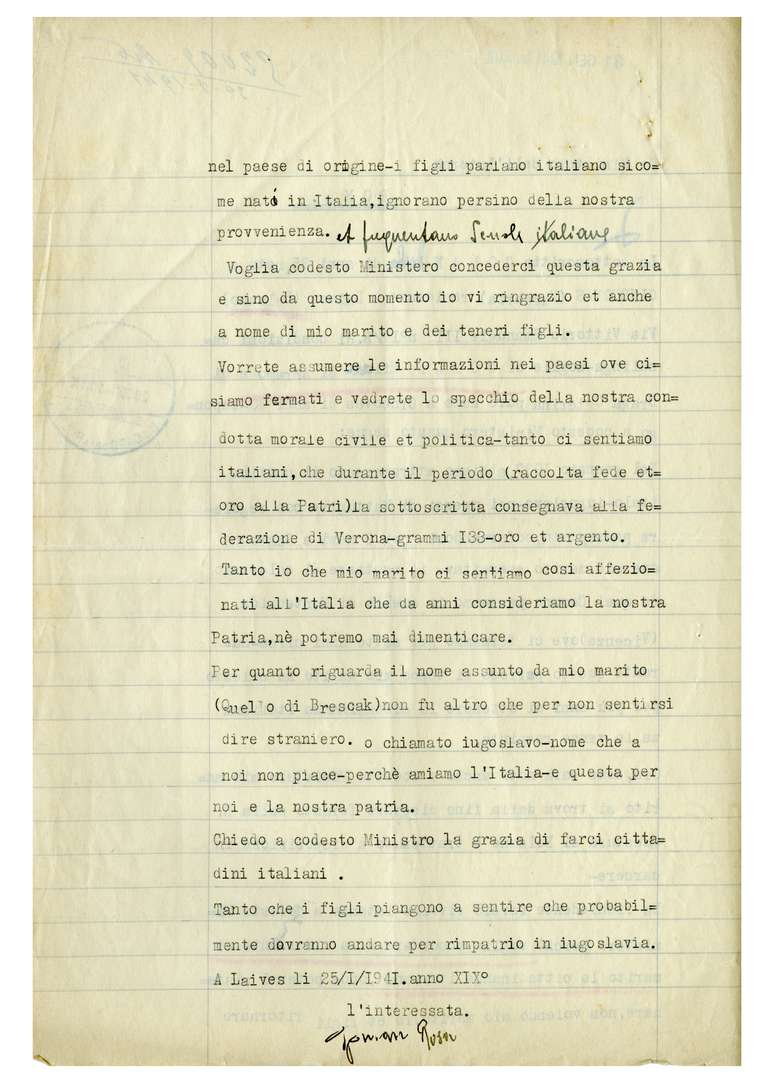Al Ministero dell’Interno, Roma
La sottoscritta Goman Ljiuba di anni 35, nata a Cinecovas (Zagabria) residente a Laives (Bolzano) via Vittorio Emanuele III n.17/B di condizione casalinga-moglie di Goman Milan di Abramo e di Draga Caterina pure nato a Cincovas di anni 40 – espongo a codesto Ministero quanto segue: nel gennaio 1937 [= 1931] abbiamo attraversato il confine italo-yugoslavo nei pressi di Mattuglie con regolare passaporto, soffermandosi per 2 anni a Sagrado ove mio marito esercitava il mestiere del calderaio. Da quel Comune passammo in quello di Montecalda (Vicenza) ove ci fermammo per sette anni circa. Durante questo periodo di tempo mio marito ha chiesto per più anni di ottenere la cittadinanza italiana ma gli venne respinta. Ora, come sarà noto anche a codesto Ministero, mio marito si trova dalla fine di dicembre fermato dalla Regia Questura di Bolzano e trattenuto a disposizione in carcere. La richiedente perciò rivolge istanza a codesto Ministero perché voglia accordare alla ricorrente et marito la cittadinanza italiana, onde potersi sistemare, non volendo mio marito, io et figli, ritornare nel Paese di origine – i figli parlano italiano siccome nati in Italia ignorano persino della nostra provenienza e frequentano scuole italiane. Voglia codesto Ministero concederci questa grazie e sino da questo momento io vi ringrazio et anche a nome di mio marito e dei teneri figli. Vorrete assumere nei paesi ove ci siamo fermati e vedrete lo specchio della nostra condotta morale civile e politica, tanto ci sentiamo italiani che, durante il periodo (raccolta fede et oro alla Patria) la sottoscriva consegnava ala federazione di Verona grammi 133 oro e argento. Tanto io che mio marito ci sentiamo così affezionati all’Italia che da anni consideriamo la nostra Patria né potremo mai dimenticare. Per quanto riguarda il nome assunto da mio marito (quello di Bresciak) non fu altro che per non sentirsi dire straniero o chiamato yugoslavo - nome che a noi non piace perché amiamo l’Italia – e questa per noi è la nostra Patria. Tanto i figli piangono a sentire che probabilmente dovranno andare per rimpatrio in Yugoslavia.
A Laives li 25.01.1941, anno X. L’interessata Goman Rosa
»Die Kinder schreien nur und sonst nichts«
Ljuba Goman | »Die Kinder schreien nur und sonst nichts« | self-evidence | Kingdom of Italy | Jan. 25, 1941 | voi_00034
Rights held by: Ljuba Goman | Provided by: Central Archives of the State (CAS) – Ministry of the Interior (Rome/Italy) | Archived under: Ministry of the Interior / DGPS / AGER Div. / Folder 51
An das Ministerium des Inneren, Rom
Ich, die unterzeichnende Ljuba [Rosa] Goman, 35 Jahre alt, geboren in Cinecovas (Zagreb), wohnhaft in der Via Vittorio Emanuele III, 17/B, Laives (Bozen), Beruf: Hausfrau, verheiratet mit Milan Goman, Sohn von Abramo [Goman] und Caterina Draga, 40 Jahre alt, ebenso geboren in Cincovas [sic], schreibe dem Ministerium mit folgender Bitte. Im Januar 193[1] passierten wir im Besitz gültiger Ausweise die italienisch-jugoslawische Grenze in der Gegend von Mattuglie, wo mein Mann als Kesselschmied tätig war. Von dort zogen wir weiter in die Gemeinde von Montecalda (Vicenza), wo wir für etwa sieben Jahre lebten. Während dieser Zeit bewarb sich mein Mann intensiv um die italienische Staatsbürgerschaft, doch sein Antrag wurde abgelehnt. Wie dem Ministerium bekannt sein wird, ist mein Ehemann nun Ende Dezember vom Königlichen Polizeipräsidium in Bozen festgenommen worden und wird bis auf weiteres im Gefängnis festgehalten. Nun möchte daher ich, die Unterzeichnende, das Ministerium darum bitten, mir und meinem Mann die italienische Staatsbürgerschaft zu verleihen, sodass wir unseren Stand offiziell machen können, angesichts der Tatsache, dass mein Ehemann und unsere Kinder und ich nicht vorhaben, in das Land unserer Herkunft zurückzukehren – unsere Kinder sprechen italienisch, da sie in Italien geboren wurden, sie wissen nichts von unserem Hintergrund und sie gehen auf italienische Schulen. Mag uns das Ministerium diesen Gefallen erlauben, für den ich schon jetzt im Voraus danken möchte, ebenso im Namen meines Ehemanns und unserer jungen Kinder. Ich bitte Sie, in den Städten, in denen wir uns aufgehalten haben, nachzufragen, und Sie werden sehen, dass wir uns stets moralisch, bürgerlich und politisch richtig verhalten haben. In der Tat fühlen wir uns derart italienisch, dass die Unterzeichnende dem Bund von Verona während der Zeit (der Sammlung von Eheringen und Gold fürs Vaterland) 133 Gramm Gold und Silber übergeben hat. Mein Ehemann und ich fühlen uns Italien derart verbunden, dass wir es nun schon seit Jahren als unser Heimatland betrachten und es niemals vergessen könnten. Was den Namen betrifft, den mein Ehemann angenommen hat (den Namen Bresciak), so war dies nur zu dem Zweck, nicht ein Fremder oder ein Jugoslawe genannt zu werden, was etwas ist, das wir nicht gerne hören, da wir Italien lieben und es für uns unsere Heimat ist. Die Kinder schreien nur und sonst nichts, wenn sie hören, dass sie möglicherweise nach Jugoslawien zurückgeschickt werden.
Laives, 25/01/1941, Jahr X. Die Antragstellerin, Rosa Goman
To the Ministry of the Interior, Rome
I, the undersigned, Ljuba [Rosa] Goman, aged 35, born in Cinecovas (Zagreb), of Via Vittorio
Emanuele III, 17/B, Laives (Bolzano), occupation: housewife, married to Milan Goman, of Abramo
[Goman] and Caterina Draga, aged 40, also born in Cincovas [sic], am writing to entreaty the
Ministry with regard to the following. In January 193[1], we crossed the Italian-Yugoslav border in
the vicinity of Mattuglie carrying valid passports, and we stayed for two years in Sagrado (Gorizia),
where my husband practised the trade of boilermaker. From there we moved to the municipality of
Montecalda (Vicenza), where we lived for around seven years. During that period of time, my
husband applied at length for Italian citizenship, but his application was denied. Now, as will be
known to the Ministry, since the end of December my husband has been detained by the Royal
Questura of Bolzano and held in prison until further notice. Now, therefore, I, the undersigned, wish
to petition the Ministry to grant Italian citizenship to myself and my husband so as to formalize our
position, given that my husband and my children and I do not wish to return to our country of origin
– our children speak Italian as they were born in Italy, they know nothing of our background, and
they attend Italian schools. May the Ministry grant us this favour, for which I would like to thank
you in advance, also on behalf of my husband and our young children. Please, check the towns
where we have stayed and you will see the reflection of our moral, civil and political conduct.
Indeed, we feel so Italian that during the period (the collection of wedding bands and gold for the
Fatherland), the undersigned gave to the Verona federation 133 grams of gold and silver. My
husband and I feel so attached to Italy that for years we have considered it our homeland, nor could
we ever forget it. As concerns the name assumed by my husband (that of Bresciak), it was only so
as not to be called a foreigner or a Yugoslav, a name we do not like to hear because we love Italy
and for us it is our homeland. The children do nothing but cry at hearing that they will probably be
repatriated to Yugoslavia.
Laives, 25/01/1941, year X. The applicant, Rosa Goman
Dži ko Ministeriumo vaš e Andrune buća, Rimo
Me, e tele skrinisardi Ljuba [Rosa] Goman, 35 beršengi, bijandi ko Cinecovas (Zagreb), pe Via Vittorio Emanuele III, 17/B, Laives (Bozen), profesija: bibućarni, prandini e Milanosa Goman, kotar o Abramo [Goman] thaj i Caterina Draga, 40 beršengi, vi voj bijandi ko Cincovas, me hramosarav te rugiv o Ministerijumo phanglo vaš akala buća. Ko Januari 1931 berš, amen naklam e italijaki – jugoslavijaki granica paša o Mattuglie, sas amen čače pasportura amenca, amen duj berš ačhilam ko Sagrado (Gorizia), kote so miro rrom kerdas buti sar kotlari. Odothar nakhlam ki komuna Montecalda (Vicenza), kote so bešlam efta berš. Ki vrama ke kodo periodo miro rrom pherdas e lila te lel italijako themutno lil, numa oleski molba sas irisardi palpale. Akana, sar ka ovel džando e Ministerijumoske, kotar o Decembresko agor miro rrom si phanglo kotar e Thagaresko Policijako Prezidijumo ko Bozen, thaj astarde le ko phanglipe bi dendos dureder informacije. Akana, odothar, me i tele skrinisardi mangav te bičhalav peticija dži ko Ministeriumo te den mange italijako themutno lil, mange thaj me rromeske te čačikerav miro themutnipe thaj mo legalutno bešimasko statuso, lendos telal i sama kaj miro rrom thaj mire čavore sar vi me, na mangas te irisaras amen palpale ko amaro avimasko them — amare čavore vorbisaren italijaki čhib sar te si bijande kote, von na džanen khanči vaš amaro avipe, thaj džan ande italijake škole. Te šaj o Ministerijumo del amen šajipe te resljaras akava lačho statuso, me angleder palikerav olenge ko miro anav, me rromesko thaj ko anav mire čhavorengo. Rugiv tumen, keren kontrola ke forora kote kaj amen bešlam thaj ka arakhen mothavipe kotar amaro moralno, themutno thaj politikano resipe. Čačes, amen haćaras amen sar Italijancora ko nakhlo vakto (vaš o kedipe pe prandipaske angrusta thaj sumnakaj vaš amaro them), o tele skrinisardo lil phenel kaj amen e tele skrinisarde dijam ki Veronaki federacija 133 gramora sumnakaj thaj rup. Miro rrom thaj me haćaras amen odobor phanle e Italijasa so beršenca dikas pe late sar te si amaro them, nikana našti te bistras ola. Phanglo e anavesa so sas lindo kotar mire rromeski rig (kotar o Bresciak), numa ma te ovel akhardo bithemutno vaj palem Jugosloveno, kodo anav na mangas te šunas, kaj amen e Italija kamas, thaj amenge si kodo amaro them. E čhavore na keren khanči aver numa roven kana šunen kaj si šajipe te oven irinde ki Jugoslavija.
Laives, 25/01/1941, berš X. Aplikanto, Rosa Goman
Credits
Rights held by: Ljuba Goman | Provided by: Central Archives of the State (CAS) – Ministry of the Interior (Rome/Italy) | Archived under: Ministry of the Interior / DGPS / AGER Div. / Folder 51
Playlist
Contextualisation
Struggle for the right to stay
The letter refers to the eventful story of the extended Goman and Bogdan families, all Yugoslav citizens who in small groups entered Italy from the end of the 1920s. Some of the family units lived in Veneto, others in Alessandria, Novara, Pisa and Bolzano. The family of Ljuba and Milos Goman settled in Laives (Bolzano), where they bought a house and land from German-speaking families from Alto Adige who had chosen to move to Germany. Some members of the Goman family continued to work as itinerant boilermakers, until they were arrested in the province of Ferrara under the circular issued by the police chief Arturo Bocchini on 11 September 1940. They were taken to Berra, one of the localities used to intern “Gypsies’ in the Emilia Romagna region, where it emerged that they had assumed false particulars.
Ljuba Goman wrote more than one letter to the fascist authorities and ultimately succeeded in having her request met. Her family were to remain in Laives, where her third child was born, for the entire duration of the war. Other Goman-Bogdan family units were sent to the Boiano internment camp in Molise in the spring of 1941. Boiano was closed in August 1941, and all the Roma interned there were transferred to Agnone, from where they managed to escape before the arrival of German troops in Molise on 9 September 1943.
In 1950 Ljuba Goman, then a widow with four children, applied to the International Refugee Organisation for an extension of her status as a stateless person. Her application was approved, enabling her to apply to emigrate to Brazil, to where her sister had already emigrated.
Playlist
Details
- Tanya Ury (Speaker English)
- Perjan Wirges (Speaker German)
- xident (Production Company)
- Perjan Wirges (Speaker Romani)
- Ljuba Goman (Author) (Laives, Kingdom of Italy)









